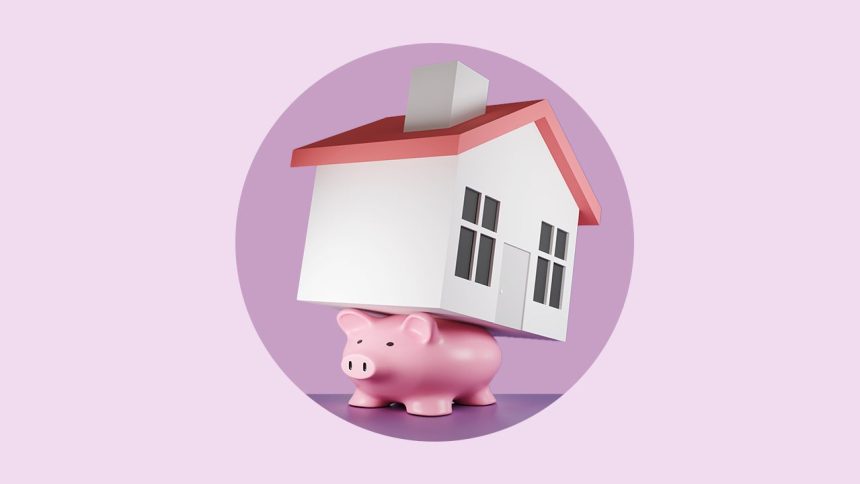Photo: Getty Images; Illustration: Bankrate
Recession concerns are back, and for some, that comes with worry for higher mortgage rates. This time, however, it’s unclear how rates might react. If we are, in fact, heading toward a recession, are steeper mortgage rates a sure bet?
What is an economic recession?
The quickie definition of a recession is simply two consecutive quarters of falling gross domestic product, or GDP. We saw that happen in the first half of 2022. And, in early 2025, the Trump Administration re-introduced tariffs on U.S. imports, which has some analysts warning that this might impact economic growth and stoke recession fears.
Officially, the National Bureau of Economic Research defines when recessions start and end. But calling a recession isn’t easy, in part because the two-quarter test is only one of many factors to consider. And the additional factors that have historically signaled a recession remain mixed:
- Inflation is down. Inflation can contribute to a recession. However, the country’s inflation rate has been declining in recent months. As of March 2025, it was 2.4 percent, according to the U.S. Bureau of Labor Statistics‘ latest data from April 10. That’s down from February’s 2.8 percent inflation rate and a further decline from 3.0 percent in January.
- The labor market continues to add jobs. Growing unemployment could be another sign of an impending recession. But the country’s unemployment rate held steady from March at 4.2 percent as of April 2025, and many industries are continuing to add jobs, including healthcare and transportation, according to the U.S. Bureau of Labor Statistics.
- GDP is contracting. GDP is the country’s gross domestic product or a measurement of economic output. When GDP contracts, it can be a sign of the direction the economy is headed in, often toward a recession. Recent government data shows that GDP has begun contracting after a three-year run of positive growth. For the first quarter of 2025, it decreased at an annual rate of 0.3 percent. That’s in contrast to the fourth quarter of 2024, when GDP increased 2.4 percent.
How past recessions affected mortgage rates
Whether a recession bears out, mortgage rates have been volatile and stubbornly high this year. Here’s what we know from past cycle turns:
Looking back on mortgage rates, we can see that, since the 1980s, the 30-year fixed rate has typically fallen during recessionary periods. Since recessions come with reduced economic activity and higher unemployment rates, it follows there’d be less demand for mortgage financing. With less demand, interest rates fall.
Even though the Federal Reserve sets monetary policy that impacts many types of financial products, fixed mortgage rates instead track the 10-year Treasury yield, a measure that isn’t immune to broader economic forces.
While declining mortgage interest rates triggered by a recession can be a positive development for prospective homebuyers, making mortgages more affordable, lending standards can also become stricter during a recession. That can make it more difficult to qualify for a mortgage.
Are we in an economic recession now?
What happens to your mortgage during a recession?
Fixed-rate mortgages are considered a hedge against inflation because they allow borrowers to lock in their monthly payment, no matter how high mortgage rates climb. If you can continue to make those payments in a recession, you’d be in a much safer position than borrowers who have adjustable-rate mortgages (ARMs), which fluctuate with the market.
On the other side of things, a recession might have an impact on your mortgage servicer’s business. Fortunately, if the company fails, there are protections in place for borrowers. You’ll be notified your loan has been sold to another lender or servicer and where to send your payments moving forward.
How to cope if you can’t make mortgage payments
If financial difficulties arise as a result of a recession or other hardship, contact your mortgage servicer as soon as possible for relief options, such as forbearance or a loan modification.
- Mortgage forbearance: If you’re in a situation that will quickly be corrected, forbearance is the way to go. With this repayment plan, your servicer allows you to miss some payments now and then adds those to future monthly payments or requires one lump sum. Alternatively, you might be able to arrange for a short-term, interest-only payment plan, with the deficit made up at a future date. However, this option is not common and must be approved by your servicer.
- Mortgage modification: If your situation is permanent in nature, ask for a mortgage modification to change the terms of the loan, such as the interest rate or repayment schedule.
For either of these options and others, contact your servicer right away to see if you’re eligible. Do not stop making payments without communicating with your servicer — if you do, you’ll damage your credit and could set foreclosure proceedings in motion.
Read the full article here














